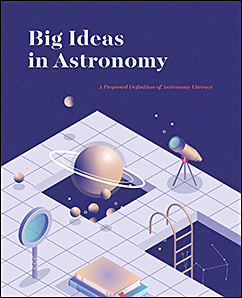IAU Seeks Help to Define Astronomical Literacy

Richard Fienberg Running Hare Observatory
This post is based on an announcement from the International Astronomical Union (IAU):
What does it mean for a citizen to be "literate" in astronomy? Those members of the IAU who are active in public outreach have practical experience of the kinds of astronomical knowledge commonly held by the general public. Until recently, however, there has not been a systematic evaluation and a clear definition of what astronomical literacy means.
 Now, the "Big Ideas in Astronomy: A Proposed Definition of Astronomy Literacy" booklet has been released with the aim of clarifying these ideas. It is intended for use by the astronomy education and outreach community, and within a process of community consultation. The booklet is the culmination of years of debate and discussion over the essential things that an astronomically literate person should know.
Now, the "Big Ideas in Astronomy: A Proposed Definition of Astronomy Literacy" booklet has been released with the aim of clarifying these ideas. It is intended for use by the astronomy education and outreach community, and within a process of community consultation. The booklet is the culmination of years of debate and discussion over the essential things that an astronomically literate person should know.
The astronomy literacy booklet presents 11 "Big Ideas," each with seven to ten sub-ideas. These cover a range of different aspects of astronomy, including the historical, philosophical, sociological, theoretical, and observational. They address a variety of topics from the Earth to the edge of the cosmos and back again.
"Big Ideas in Astronomy" is intended to be an evolving resource for the community to contribute to and draw from in working toward their goals. The booklet will benefit wider society by informing nations and states about what constitutes astronomical knowledge for their curricula. It also provides a framework for policy suggestions for governments, teacher training institutes and programs, and a set of guidelines for curriculum development and assessment tools. To this end, the IAU intends to invite the community, in the following months, to systematically review this document and consider whether it is an accurate representation of what experts consider astronomical literacy to be.
The project is led by Leiden Observatory, Leiden University (the Netherlands), and the Institute of Astrophysics and Space Sciences (Portugal), with numerous collaborators and contributors from all around the world. It was produced within the framework of the IAU Commission C1, Astronomy Education and Development, in particular, the Working Group on Literacy and Curriculum Development.

